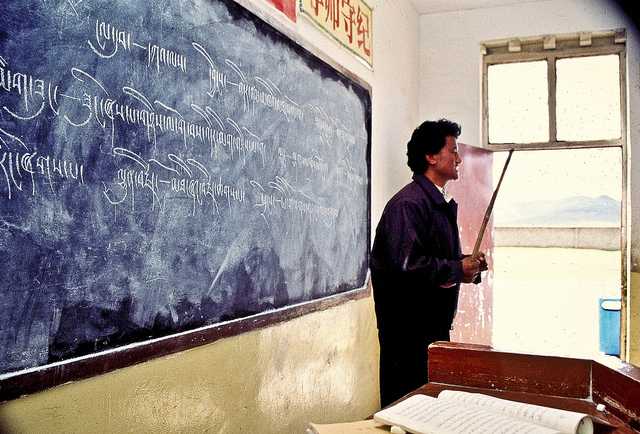Ever felt like being able to speak more than one language would make you that bit cooler? Ever got lost and wish you could ask for directions instead of miming and putting your charades skills to the test? Ever wished you could chat up that guy or girl in their language, or overhear that conversation over there in the corner? Coming from an English speaking country, I am personally very spoiled when I go travelling since it’s such a universal language and therefore I’ve been somewhat lazy at language learning.
Wherever I go people speak to me in English, so even if I want to practice speaking their language people still talk to me in my own mother tongue. There is something so attractive and impressive about people who speak several languages. Being fluent in two or more languages is something so many of us wish we could do, but in order to do that you have to put the effort. Finding the time and the motivation to learn a foreign language can be tricky so I’ve put together a list of ways you can learn that might make it less of a chore.
1 – Movies and Television
One of the ways many people learn languages is by watching TV programmes or films with the subtitles on. Explore the different language subtitles on the DVD you are watching, or rent a foreign movie and read the subtitles in your own language. It’s a more relaxing and entertaining way to learn a language and you can sit there, chill out, enjoy a good movie and absorb the words and phrases without having to actively take part in learning.
It’s also a great way to learn slang and more conversational language. The Swedes and the Norwegians speak such excellent English partly because they only get TV shows and movies in English with no dubbing or subtitles. Watching foreign movies and television programmes will get you used to hearing the spoken language.
>> Check out great movies that inspire travel
[social]
2 – CDs and tapes
Language course CDs are great if you don’t have much time on your hands as you can listen to them on the go. Burn them onto your iPod and listen to them whilst you’re lying on the beach, going for a run, trying to get to sleep at night, on the bus, in the car or waiting in line in the supermarket. Make use of all that time spent waiting by becoming fluent in another language.
I put my iPod on shuffle and when a language track comes on, even if I don’t feel like it, I make sure I listen to it. It’s a bit strange at a party though when after 50 Cent you get ‘French Part One’ blaring out of your speakers. Research and pick your language CDs carefully as some contain different methods and ways of learning. Choose the method that is going to be right for you, even if it costs that little bit extra. This is probably the most successful method for me, I learnt more French from CDs than I ever did in school, and you can actually hear the way things are supposed to be pronounced.
3 – Music
Everyone loves music because it’s fun and having fun is important when you’re trying to learn a language. Songs are catchy and easy to listen to, so try downloading or buying music in a foreign language. Repetition is the key to learning, so if you listen to the same song over and over again you will eventually know the words.
It’s a great way to learn about the popular or traditional music styles in that country too. If you have a favourite popular song try to find it sung in another language or find the lyrics on the internet and sit there with them whilst you listen to the song.
4 – Visit the Country
By far the best way to learn the language of a country is immersion. Live in the country where they speak the language you want to learn and perhaps even stay with a host family there. By living in the country you are forced to learn the language because you are interacting every day with people in a language that is not your own. You will see the words on things like road signs and menus and hear them being spoken wherever you go.
Whether it’s talking to people at the checkout in the supermarket, asking for directions, ordering food in a restaurant or chatting to people at a social gathering, you will be speaking the language on a daily basis. Being in a particular country for a long period of time you will be forced to learn the language in order to be able to communicate with people. In many foreign countries it is also much cheaper to hire a tutor or to take a course, so it is worth looking into before you go. For instance, if you would like to learn Spanish it is particularly cheap to hire tutors and take classes in South American countries.
>> Read about learning Spanish in Mexico
5 – Find a foreign friend
When you’re backpacking you’re bound to meet a variety of people from different countries in your hostel, Swedish, French, German, Norwegian…so take advantage of this great opportunity to learn a foreign language and ask them how to say things in their lingo. Play a few drinking games in your hostel and bond with your roommates whilst practising your chosen language, you’re speech will probably improve with every beer!
Have fun with it, one of the first things people always ask is how to say rude words or swear words in another language. Better still, get a foreign girlfriend or boyfriend and you’ll soon be motivated to learn their language! Foreign people won’t mind if you ask them how to say something in their language, in fact they’ll be flattered that you’re keen to make the effort to learn.
6 – Newspapers and magazines
I’ve picked up the latest edition of my favourite glossy magazine in the airport before, only to realise that I’ve made a mistake and picked it up in French. Instead of leaving it in the seat in front of me on the plane, I’ve tried to decipher what it says and use the pictures to help me out, and guess what, it works.
Soon I’ve learnt who’s dating who and what the latest fashion must-haves are, whilst at the same time learning to read a foreign language. Practice seeing the language in written form by reading newspapers and magazines.
Words are not always written how they sound so reading newspapers and magazines is a great way to see them in written form. Get your news in a foreign language and learn new vocabulary in subjects such as economics, business and politics. If there are words you don’t understand, write them down and look them up in a dictionary later.
7 – Phrase Books and dictionaries
Phrase books can be useful for the odd sticky situation or emergency when you need to whip your book out and know how to communicate something, but unless you want to go around with a book in front of your face reciting sentences parrot fashion, phrase books can only take you so far. Phrase books are great for learning simple greetings, numbers and knowing simple tourist phrases, but to develop your knowledge further you will need to know how to structure sentences and learn about grammar.
This is where grammar books come in so that you can learn tenses and the rules for forming sentences. Dictionaries are also useful if you need to look up a word you don’t know or if you want to expand your vocabulary.
8 – Talk in the language for a day
Just for one day, instead of walking around talking in your own language, why not make yourself say everything in a foreign language whether you know how to say it or not. Sometimes it can be embarrassing to speak in a foreign language out loud if you’re not really confident about it, so talk to yourself when nobody’s around.
Just go about your day-to-day business whilst thinking or saying what you’re doing in your chosen language. Think of yourself as a narrator narrating what you are doing. Think a sentence through in your head and try to work out what it would be in that language and if you don’t know something, then go and look it up. If you don’t want to look like a weirdo, you don’t need to talk out loud, just think it in your head.
9 – Take a class
Some people prefer to learn languages by being in a classroom because it gives them a place to focus and a physical building where they can go to learn. The benefits of learning in a classroom are that you meet other people, you are being taught by someone who has been trained to teach you and you can get support if you are having trouble with anything. If you have a little money to spare then this can be a good option.
You can learn at your local college, take a night class, a summer class or travel to the country or the place you would like to visit and sign up for a school there. Drop by in person or look online and read their weekly class timetable to see if it is going to be at a convenient time for you. Learn at a pace that suits you, whether that’s a quick intensive course or done over a longer period of time and make sure you enter at the right level for you. Make sure you’re constantly progressing and that you don’t feel like you’re being held back. There are plenty of online courses but make sure you research them thoroughly before handing over any cash.
>> Discover 5 budget-friendly locations for learning a new language
10 – Language swap
A language exchange is usually two or more people who speak different languages practicing each other’s language, but sometimes you can exchange another skill in return for language practise. Look through the classifieds online and in local newspapers and you’ll sometimes find adverts for language swaps. You can swap language learning for guitar lessons, accommodation and all sorts of other things. Alternatively there are various online forums and language exchange sites in the fabulous world of the internet. If you’re a little more traditional why not get a penpal and do it the old fashion way, write a letter.
Ultimately there is no right or wrong way to learn a language, so think about your personality, the amount of time you’re willing to dedicate to language learning and then work around what is suitable for you. Most of all, remember to have fun and enjoy it!
Learn more about language and travel:



